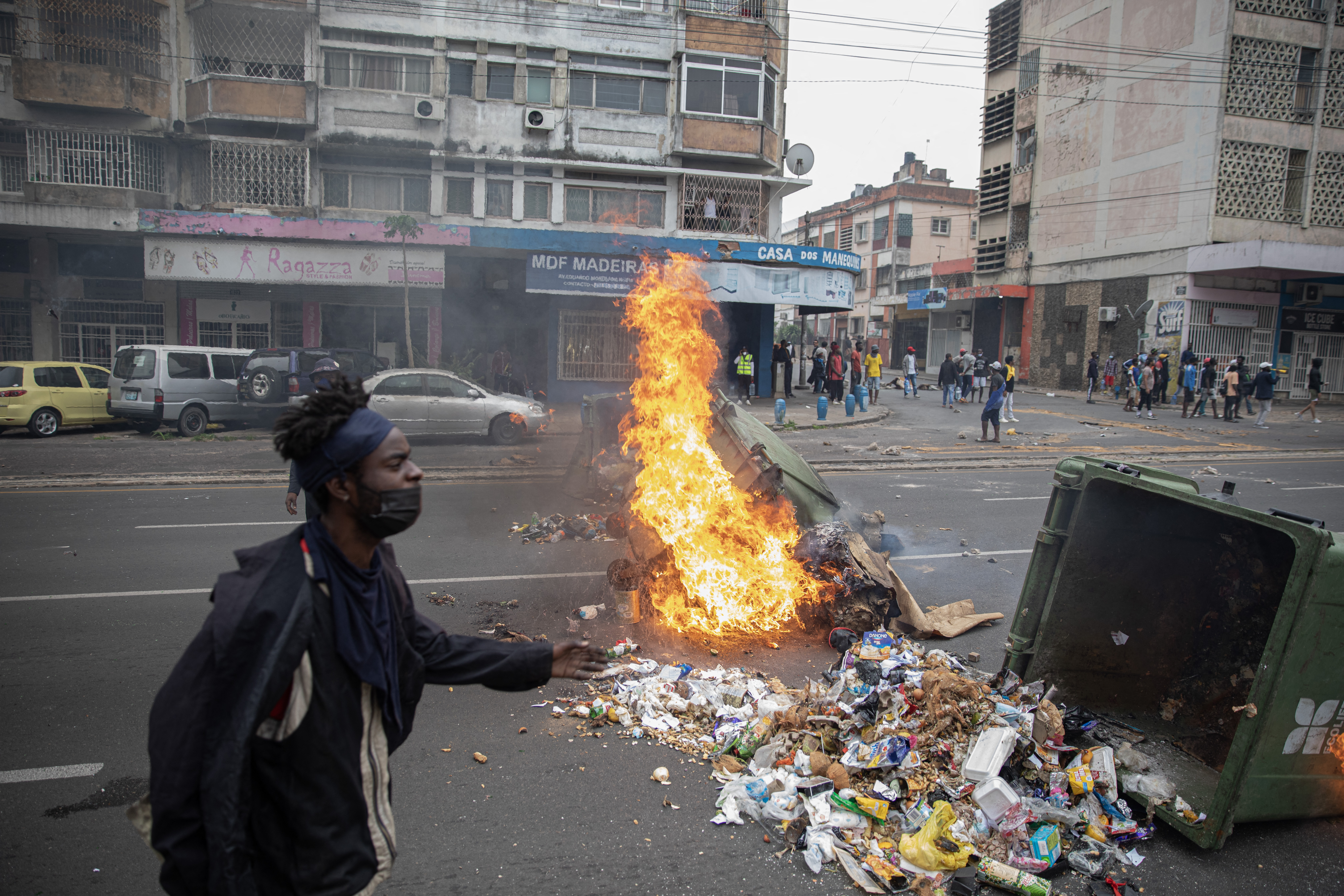The Lebombo port of entry between South Africa and Mozambique has been reopened after the Border Management Authority temporarily suspended operations on Wednesday, 13 November.
The closure came as demonstrations started anew and protesters heeded opposition leader Venâncio Mondlane’s call for what has been termed the fourth stage of demonstrations in the wake of the country’s disputed presidential election on 9 October.
Mondlane was a candidate but has called for protests since 21 October. He does not recognise the National Electoral Commission’s declaration that the Mozambique Liberation Front (Frelimo) won the election.
On Thursday morning, Border Management Authority spokesperson Mmemme Mogotsi told Daily Maverick that while the processing of trucks and cargo had resumed, the authority remained on high alert as the Mozambican government had cautioned that there could be a resurgence in protests.
Wednesday was the first day of demonstrations which are expected to last three days. On Tuesday, 12 November, Mondlane took to social media, calling on protesters to demonstrate at all borders, ports and all the provincial capitals.
“We will paralyse all activities so that people will understand that we are tired,” he said.
Speaking on the sidelines of the inaugural Border Management Authority (BMA) Conference and Expo on Wednesday, 14 November, BMA commissioner Dr Micheal Masipato said the body had temporarily suspended the passage of people and cargo at the Lebombo port of entry.
Read more: ‘Maputo is like a warzone’ — Activists lament global inaction as protest and state suppression deepen in Mozambique
“The continuing and intensified protest on the Mozambican side of the port is mainly driven by protesting about the situation in Mozambique. Our counterparts from Mozambique did indicate to us protesters had blocked the Maputo corridor,” he said.
While the protesters had barricaded the roads, Masipato insisted that the demonstrations were peaceful and there were no threats of violence.
Political crisis-turned-human rights crisis
Speaking at an urgent high-level seminar on the political and human rights crisis in Mozambique on Thursday, the director of the Centre for Democracy and Human Rights in Mozambique and chairperson of the Southern Africa Human Rights Defenders Network, Professor Adriano Nuvunga, said the sustained protest highlights that many Mozambican citizens do not recognise the results of the election and don’t trust the institutions to adjudicate on the matter.
The gathering was organised by the Southern Africa Human Rights Defenders Network (SouthernDefenders), together with the Centre for Democracy and Human Rights – Mozambique, the Pan-African Human Rights Defenders Network (AfricanDefenders), Amnesty International, Chapter One Foundation (Zambia), and the Crisis in Zimbabwe Coalition, and sought to address the escalating political and human rights poly-crisis in Mozambique.
“Hence the appetite to go to the streets as called by Mondlane. The country has been paralysed and this is only the first stage of the fourth wave of demonstrations,” Nuvunga said.
Despite the peaceful nature of the demonstration, the police responded with excessive force. According to Amnesty International deputy regional director (research) for southern Africa, Nokukhanya Farisè, the organisation had received credible reports that nine people were shot in Nampula, the capital of Nampula province.
Farisè added that seven of the nine people had been killed, and four people were shot in their homes.
Read more: SA defers to SADC and AU assessment of Mozambique elections
The organisations claimed that since the protests began on 21 October more than 4o people have been killed by police gunfire, while 1,000 have been injured, many as they tried to flee the assaults.
“The brutality of the police is leading to a human rights crisis as the government is using excessive force, is using live ammunition and is killing innocent citizens for coming out to protest within the legal and constitutional infrastructure of the country,” Nuvunga said.
Calls on SADC
Farisè criticised the Southern African Development Community (SADC) and other regional and international institutions for not condemning the excessive use of force and cracking down on human rights by the Mozambican police.
These institutions, including neighbouring countries, needed to speak forcefully about this situation and call for the government to stop shooting people and stop using excessive force against people who were exercising their human rights.
Though both the SADC and African Union (AU) observer mission declared that the elections “were conducted in a calm and professional manner” and that it is “up to the end of the electoral process”, opposition parties and candidates, civil society and some international election observers have flagged irregularities and potential election fraud.
The SADC is set to meet in Harare, Zimbabwe from 16 to 20 November to discuss the unrest in Mozambique, among other things. However, Nuvunga insists that the SADC cannot adequately discuss the crisis until an envoy is sent to the region on a fact-finding mission.
The envoy would gather on-the-ground information documenting electoral issues, the scale of police repression, human rights violations and the social impact of the crisis.
“It is important to have an envoy to ensure that the voices of the Mozambican people are heard. Without an envoy from SADC, we run the risk of having my president (Filipe Nyusi) being the only voice at the summit. That will be partisan, that will not reflect the true status of the political and human rights crisis,” Nuvunga said. DM




